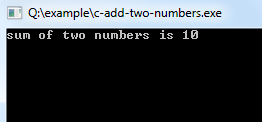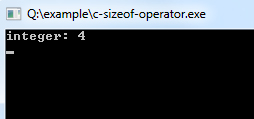Declaration & Assignments
C Operators
C operators are symbols that is used to perform mathematical or logical manipulations. C programming language is rich with built-in operators. Operators take part in a program for manipulating data and variables and form a part of the mathematical or logical expressions
Types of Operators in C
C offers various types of operators having different functioning capabilities.
Arithmetic Operators
Arithmetic Operators are used to perform mathematical calculations like addition (+), subtraction (-), multiplication (*), division (/) and modulus (%).
| Operator | Description |
|---|---|
| + | Addition |
| – | Subtraction |
| * | Multiplication |
| / | Division |
| % | Modulus |
C Program to Add Two Numbers
Example:
#include <stdio.h>
void main()
{
int i=3,j=7,k; /* Variables Defining and Assign values */
k=i+j;
printf("sum of two numbers is %d\n", k);
}Run Program Output:

Increment and Decrement Operators
Increment and Decrement Operators are useful operators generally used to minimize the calculation, i.e. ++x & x++ means x=x+1 or -x & x−−means x=x-1. But there is a slight difference between ++ or −− written before or after the operand. Applying the pre-increment first add one to the operand and then the result is assigned to the variable on left where as post-increment first assigns the value to the variable on left and then increment the operand.
| Operator | Description |
|---|---|
| ++ | Increment |
| −− | Decrement |
Relational Operators
Relational operators are used to compare two quantities or values.
| Operator | Description |
|---|---|
| == | Is equal to |
| != | Is not equal to |
| > | Greater than |
| < | Less than |
| >= | Greater than or equal to |
| <= | Less than or equal to |
Logical Operators
C provides three logical operators when we test more than one condition to make decisions. These are: && (meaning logical AND), || (meaning logical OR) and ! (meaning logical NOT).
| Operator | Description |
|---|---|
| && | And operator. Performs a logical conjunction on two expressions. (if both expressions evaluate to True, result is True. If either expression evaluates to False, result is False) |
| || | Or operator. Performs a logical disjunction on two expressions. (if either or both expressions evaluate to True, result is True) |
| ! | Not operator. Performs logical negation on an expression. |
Bitwise Operators
C provides special operator for bit operation between two variables.
| Operator | Description |
|---|---|
| << | Binary Left Shift Operator |
| >> | Binary Right Shift Operator |
| ~ | Binary Ones Complement Operator |
| & | Binary AND Operator |
| ^ | Binary XOR Operator |
| | | Binary OR Operator |
Assignment Operators
Assignment operators applied to assign the result of an expression to a variable. C has a collection of shorthand assignment operators.
| Operator | Description |
|---|---|
| = | Assign |
| += | Increments, then assigns |
| -= | Decrements, then assigns |
| *= | Multiplies, then assigns |
| /= | Divides, then assigns |
| %= | Modulus, then assigns |
| <<= | Left shift and assigns |
| >>= | Right shift and assigns |
| &= | Bitwise AND assigns |
| ^= | Bitwise exclusive OR and assigns |
| |= | Bitwise inclusive OR and assigns |
Conditional Operator
C offers a ternary operator which is the conditional operator (?: in combination) to construct conditional expressions.
| Operator | Description |
|---|---|
| ? : | Conditional Expression |
Special Operators
C supports some special operators
| Operator | Description |
|---|---|
| sizeof() | Returns the size of an memory location. |
| & | Returns the address of an memory location. |
| * | Pointer to a variable. |
Program to demonstrate the use of sizeof operator
Example:
#include <stdio.h>
void main()
{
int i=10; /* Variables Defining and Assign values */
printf("integer: %d\n", sizeof(i));
}Run Program Output:

Comments
Post a Comment